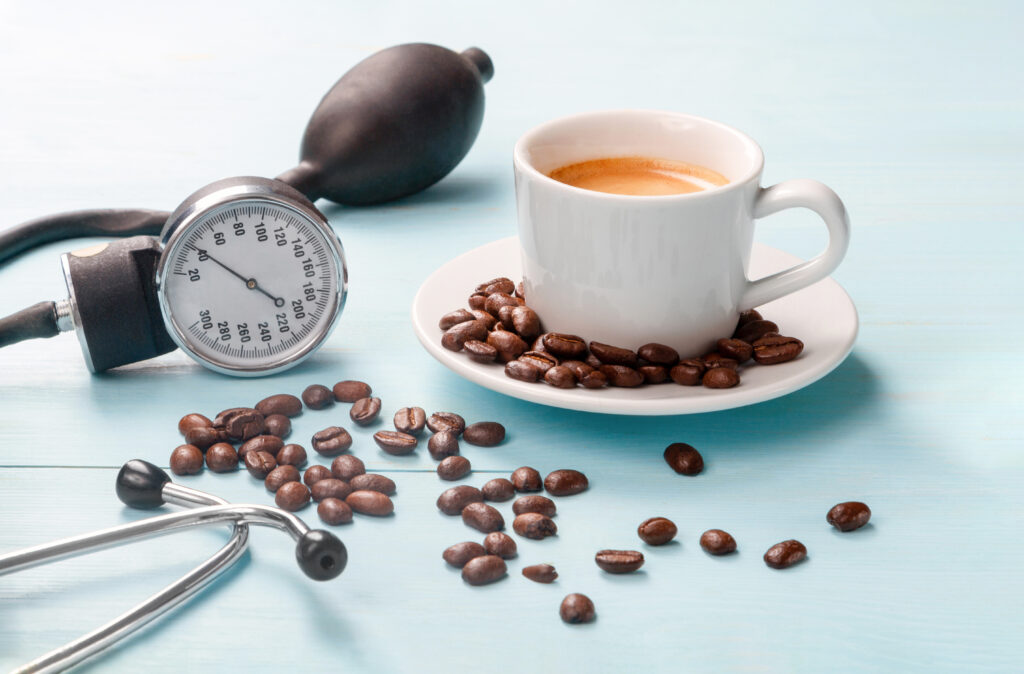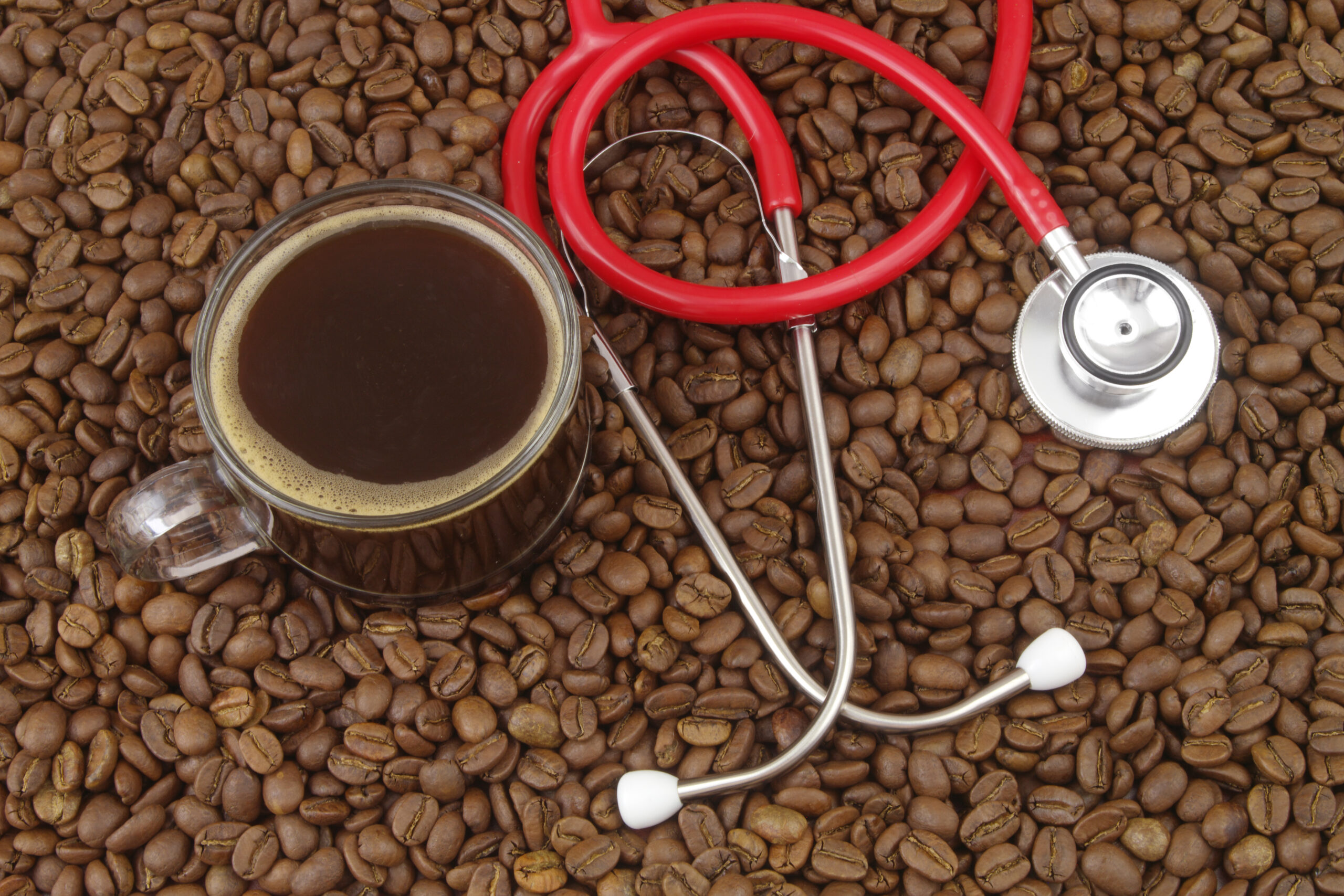Many of us know caffeine best as the thing that helps get our mental gears turning in the morning or push through an afternoon slump. That’s because caffeine is a known stimulant, targeting your central nervous system to temporarily increase focus and attention while reducing fatigue.
Some people get their caffeine boost from coffee or tea, while others prefer energy drinks or soft drinks. You’ll even find some caffeine in chocolate and certain over-the-counter medications you might use for pain relief or managing cold symptoms. While all of these sources contain caffeine, the caffeine content varies and can have different rates of absorption, which determines how quickly (and for how long) you feel its effects.
How much caffeine is too much when it comes to your heart health? Are energy drinks bad for your heart? Are there any cardiovascular benefits or is there a harmful caffeine effect on blood pressure? Let’s answer these questions and more.
How Caffeine Affects Your Heart
Chemically, caffeine blocks the action of adenosine, a neurotransmitter that promotes sleep, which is why people often consume it to stay awake and energized.
As caffeine stimulates your central nervous system, it also releases hormones like adrenaline, which temporarily increases blood pressure and heart rate.
Some of the short-term effects of caffeine on your heart can include:
- Increased heart rate
- Elevated blood pressure
- Heart palpitations or a “fluttering” sensation
- Increased alertness and focus
In the long term, regular caffeine consumers often develop a tolerance to it, which reduces its effects on heart rate and blood pressure that may have previously been noticeable.
Potential Caffeine Interactions
Caffeine can interact with medications, particularly those related to heart health, like:
- Beta-blockers (propranolol, metoprolol): Caffeine can counteract the effects of beta-blockers, potentially reducing their effects in managing heart rate and blood pressure.
- Calcium channel blockers (diltiazem, verapamil): Caffeine may enhance the stimulating effects of these medications, potentially leading to increased heart rate or irregular heart rhythms.
- Blood thinners (warfarin): Caffeine can interfere with the metabolism of blood thinners, potentially increasing the risk of bleeding complications or reduced blood clotting effectiveness.
- Anti-arrhythmic medications (amiodarone, sotalol): Caffeine can aggravate irregular heartbeats and interfere with the effectiveness of anti-arrhythmic drugs.
- ACE Inhibitors (lisinopril, enalapril): Caffeine can raise your blood pressure, possibly reducing the effectiveness of these medications and making it harder to manage hypertension.
- Diuretics (hydrochlorothiazide, furosemide): Caffeine has mild diuretic effects itself and can amplify fluid loss caused by diuretics, potentially increasing the risk of dehydration and electrolyte imbalances.
If you take medications related to cardiovascular health, it’s a good idea to monitor your caffeine intake and consult your healthcare team to ensure safety.
Are There Benefits of Caffeine for Heart Health?
The short answer is yes (in small to moderate doses!).
Caffeine helps increase attentiveness and concentration, but that doesn’t mean it’s time to make coffee the new water, especially if you have an existing heart condition. However, there is evidence to suggest that moderate caffeine consumption may offer potential benefits for your health — and specifically, heart health.
First, some studies indicate that regularly enjoying a moderate intake of caffeine may have a protective effect against cardiovascular-related mortality, hypertension, cholesterol, heart failure, and atrial fibrillation. It’s also been associated with improved blood vessel function and blood flow.
One 2021 meta-analysis including 21 studies with more than 2.4 million participants concluded that there’s a 21% lower risk of having a stroke among people who consume 3-4 cups of black coffee per day (but not more than that).
Why? One reason is that caffeine acts as an antioxidant, neutralizing unstable molecules called free radicals, which can build up and cause stress and damage to your cells.
Over time, this cellular stress contributes to aging and the development of chronic diseases, including heart disease. Some beverages that contain caffeine also contribute other antioxidant compounds. For example, coffee contains antioxidants called chlorogenic acids and tea contains catechins, which help reduce inflammation and improve endothelial function.
Caffeine may also help reduce inflammation by decreasing pro-inflammatory markers (like C-creative protein and increasing anti-inflammatory markers (like adiponectin). This matters because of the widespread association between underlying inflammation and modern chronic diseases.
Research also shows that caffeine consumption can be helpful for supporting exercise performance. It might help by releasing more calcium in your muscles (which can improve muscle contractions) or by keeping your muscle energy stores from being used up too quickly. It also blocks certain brain receptors that normally make you feel tired. This is important for heart health because the ability to engage in physical activity strengthens the heart muscle, helps lower blood pressure, reduces bad cholesterol levels, and improves blood flow.
Finally, a 2024 study found an association between average caffeine consumption and all‐cause mortality, suggesting that even people with high blood pressure may benefit from moderate caffeine intake of 300-400 mg per day.
How Much Caffeine is Too Much?
For most people, moderate caffeine consumption is considered safe and doesn’t pose significant risks to your heart. How much caffeine is too much?
According to the FDA, most people can tolerate 400 mg or less per day. However, according to the available research, most people who experience cardiovascular effects from ingesting up to 600 mg/day are mild, temporary, and reversible, with no lasting adverse effects.
However, caffeine can affect people differently, which may be partially due to your genetics. In individuals who are sensitive to caffeine or who have pre-existing heart conditions, such as atrial fibrillation, excessive caffeine intake could potentially trigger palpitations, increased heart rate, or even irregular heart rhythms.
Some research suggests that most people probably aren’t at risk for arrhythmias from drinking 2-3 cups of black coffee per day, but more research is needed.
It’s important to understand your personal tolerance to caffeine. Take notice if you experience heart-related symptoms, like increased heart rate, after consuming caffeinated beverages, as this may indicate a need to reduce your caffeination.
Approaching Caffeine Intake Mindfully

Caffeine isn’t something I would label as being inherently “bad” or “good”. It has potential benefits when used in moderate amounts, but can pose problems when consumed in excess. If you enjoy caffeine as part of your lifestyle, there’s nothing wrong with it as long as it’s done mindfully, especially if you have a lower caffeine tolerance.
It’s helpful to have an idea of how much caffeine you’re regularly consuming as well as the (likely multiple) caffeine sources in your diet and how it affects your body. If you experience things like jitters, trouble sleeping, or an increased heart rate after consuming caffeine, it’s probably a good idea to reduce your intake.
Looking for alternatives? Try herbal teas, decaf coffee, or naturally caffeine-free drinks like plain or seltzer water infused with fruits (like berries), veggies (like cucumber), or herbs (like basil or mint).
Additionally, drinking caffeine earlier in the day can help mitigate its potentially disruptive effects on your sleep. Ideally, aim to consume it before noon. Caffeine has a half-life of around 3-7 hours in adults, meaning that it won’t all be metabolized and gone from your system for 6-14 hours after you drink it.
Caffeine and Heart Health: Final Thoughts
Caffeine can be a tricky ingredient when it comes to heart health, but that doesn’t mean you have to stop enjoying your daily cup of coffee. What’s best is paying attention to how caffeine-sensitive you are, ensuring it’s safe to consume alongside any medications you’re on, and being mindful of your intake.
Need help? As a cardiovascular dietitian, I provide science-based guidance to my clients based on their personal needs. Click here to learn more about my 1:1 services. You can also schedule a complimentary 15-minute discovery call with me here.
Frequently Asked Questions
Are energy drinks bad for your heart?
Energy drinks could pose harm to your heart because of their high caffeine and added sugar content. These ingredients may promote increased heart rate, blood pressure, and potential arrhythmias, especially if you have pre-existing heart conditions.
Is it safe to drink coffee if I have high blood pressure?
Drinking coffee with high blood pressure can be safe for most people if consumed in moderation, which is defined by the FDA as 400 mf per day or less. However, everyone responds to caffeine differently. It’s important to monitor your blood pressure and consult your healthcare team to determine a safe amount for you.
Does caffeine increase the risk of heart disease?
No, there is no evidence that moderate caffeine consumption is associated with an increased risk of heart disease. It may even offer protective benefits for some people, but that doesn’t mean more is better.
How much caffeine is safe to consume daily?
The FDA states that, for most healthy people, a daily caffeine intake of up to 400 mg is considered safe with minimal side effects (but this can vary between people).
Can I drink caffeine before surgery?
It’s usually advised to avoid caffeine before surgery. This is because caffeine increases blood pressure and heart rate, which could interfere with anesthesia management. It’s important to follow your surgeon’s guidelines on preoperative food and caffeine consumption.
Will caffeine intake affect my stress test?
Yes, caffeine intake can affect a stress test, which is why it’s usually recommended to avoid caffeine for at least 24 hours before having one. Caffeine can artificially increase your heart rate and blood pressure, which may skew the results and prevent an accurate cardiovascular assessment.
References
- Urry E, Landolt HP. Adenosine, caffeine, and performance: from cognitive neuroscience of sleep to sleep pharmacogenetics. Curr Top Behav Neurosci. 2015;25:331-366. doi:10.1007/7854_2014_274
- Belayneh A, Molla F. The Effect of Coffee on Pharmacokinetic Properties of Drugs : A Review. Biomed Res Int. 2020;2020:7909703. Published 2020 Jul 24. doi:10.1155/2020/7909703
- Voskoboinik A, Koh Y, Kistler PM. Cardiovascular effects of caffeinated beverages. Trends Cardiovasc Med. 2019;29(6):345-350. doi:10.1016/j.tcm.2018.09.019
- Mendoza MF, Sulague RM, Posas-Mendoza T, Lavie CJ. Impact of Coffee Consumption on Cardiovascular Health. Ochsner J. 2023;23(2):152-158. doi:10.31486/toj.22.0073
- Shao C, Tang H, Wang X, He J. Coffee Consumption and Stroke Risk: Evidence from a Systematic Review and Meta-Analysis of more than 2.4 Million Men and Women. J Stroke Cerebrovasc Dis. 2021;30(1):105452. doi:10.1016/j.jstrokecerebrovasdis.2020.105452
- Rodak K, Kokot I, Kratz EM. Caffeine as a Factor Influencing the Functioning of the Human Body-Friend or Foe?. Nutrients. 2021;13(9):3088. Published 2021 Sep 2. doi:10.3390/nu13093088
- Martins GL, Guilherme JPLF, Ferreira LHB, de Souza-Junior TP, Lancha AH Jr. Caffeine and Exercise Performance: Possible Directions for Definitive Findings. Front Sports Act Living. 2020;2:574854. Published 2020 Dec 11. doi:10.3389/fspor.2020.574854
- Wang K, Li Z, He J. Association of caffeine consumption with all-cause and cause-specific mortality in adult Americans with hypertension. Food Sci Nutr. 2024;12(6):4185-4195. Published 2024 Mar 8. doi:10.1002/fsn3.4079
- US Food and Drug Administration. (2024). Spilling the Beans: How Much Caffeine is Too Much? Retrieved from: https://www.fda.gov/consumers/consumer-updates/spilling-beans-how-much-caffeine-too-much
- Turnbull D, Rodricks JV, Mariano GF, Chowdhury F. Caffeine and cardiovascular health. Regul Toxicol Pharmacol. 2017;89:165-185. doi:10.1016/j.yrtph.2017.07.025
- Yang A, Palmer AA, de Wit H. Genetics of caffeine consumption and responses to caffeine. Psychopharmacology (Berl). 2010;211(3):245-257. doi:10.1007/s00213-010-1900-1
- Surma S, Romańczyk M, Filipiak KJ, Lip GYH. Coffee and cardiac arrhythmias: Up-date review of the literature and clinical studies. Cardiol J. 2023;30(4):654-667. doi:10.5603/CJ.a2022.0068
- Temple JL, Bernard C, Lipshultz SE, Czachor JD, Westphal JA, Mestre MA. The Safety of Ingested Caffeine: A Comprehensive Review. Front Psychiatry. 2017;8:80. Published 2017 May 26. doi:10.3389/fpsyt.2017.00080
